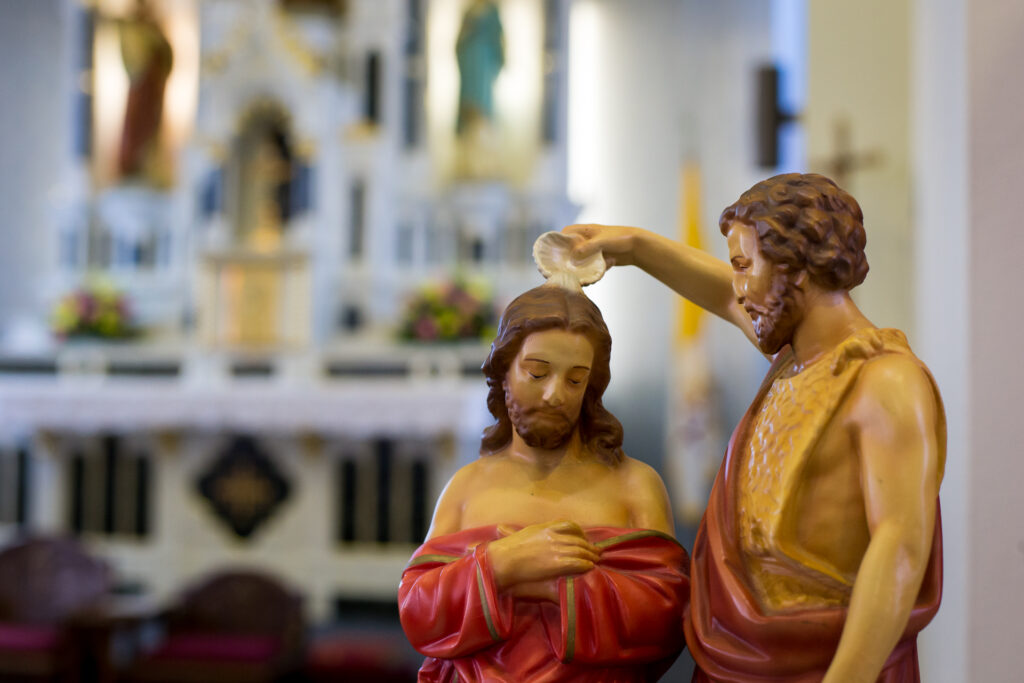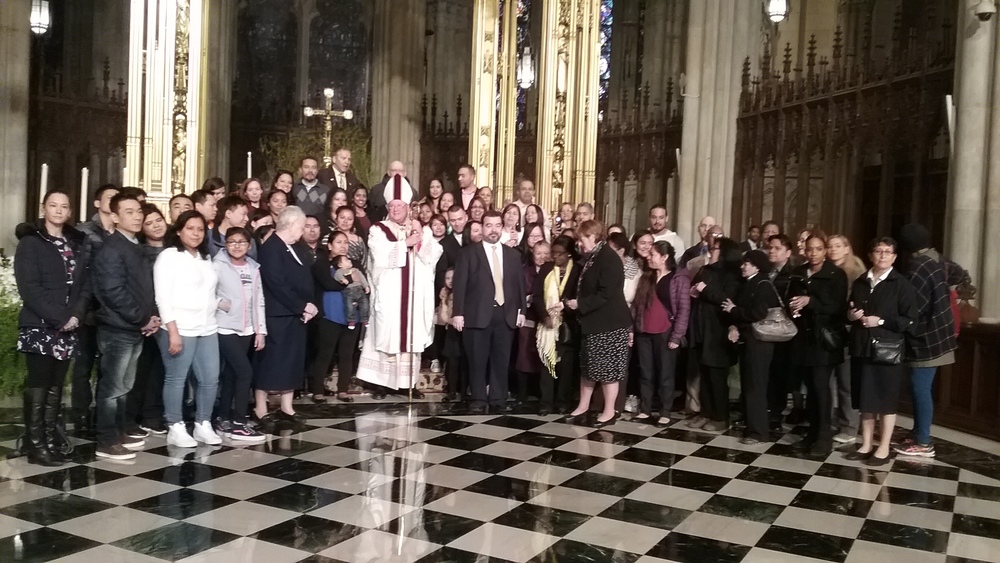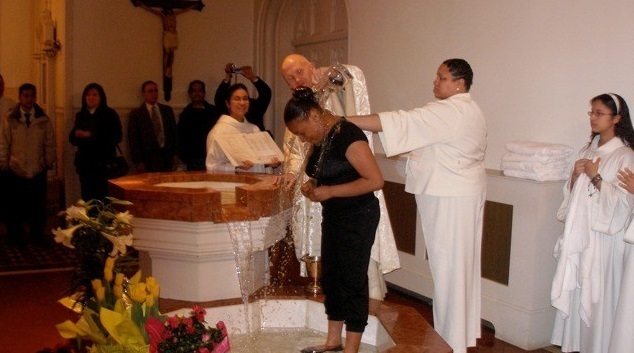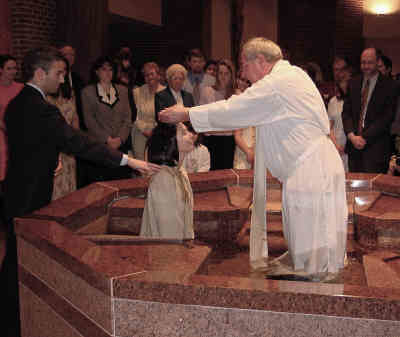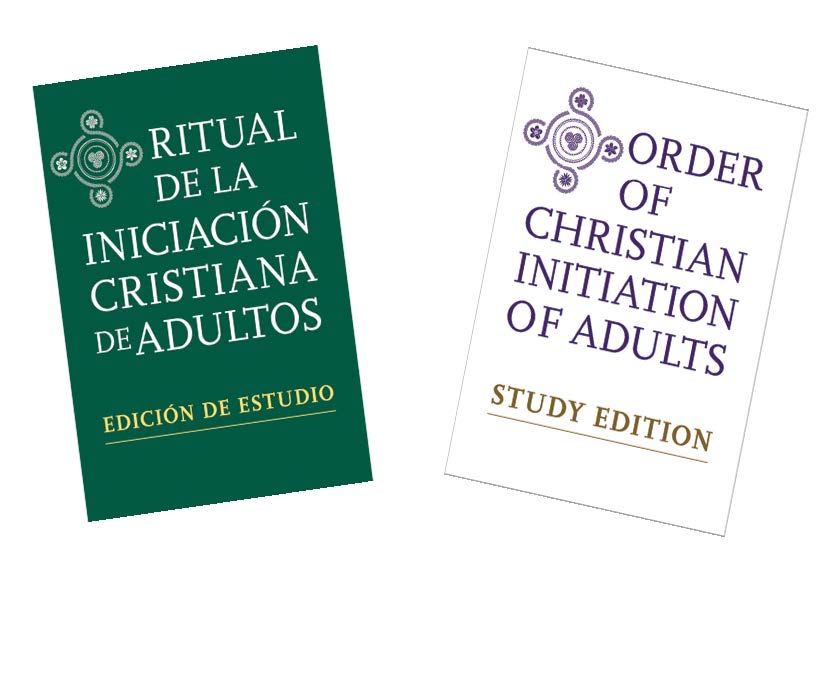
PRE-ORDER THE NEW CATECHUMENATE RITUAL BOOK TODAY!
The Order of Christian Initiation for Adults (OCIA) is the revised ritual book which is use with adults who seek to formally join the Catholic Church. It replaces the previous ritual text…Rite of Christian Initiation of Adults (RCIA).
Editions Available for Pre-order:
English: The Order of Christian Initiation of Adults: Study Edition
Spanish: Ritual de la Iniciación cristiana de adultos. Edición de estudio
Preorders received by September 30, 2024 will receive a 10% discount.
The Rite of Christian Initiation of Adults (RCIA) is the official ritual text of the Church which directs, supports and sustains the way of faith and conversion by which adults and children who have reached the age of reason are initiated into the Catholic Church.
Although many Catholics are not familiar with it, the Rite of Christian Initiation of Adults was restored to the Church in 1972 at the request of the Second Vatican Council as the normative way by which adults (and children who have reached the age of reason) are to be initiated into the Catholic Church.
In 1988, the National Conference of Catholic Bishops of the United States of America published the ritual text we now use.
The RCIA is normative for the Christian initiation of adults and children of catechetical age. The initiation of catechumens is a gradual process that takes place within the community of the faithful.
The rite is called:
The Rite of Christian
Initiation of Adults
The process is called:
The Catechumenate
How Do I Become a Catholic?
Liturgy Training Publications offers a short, free video on the (RCIA) Christian Initiation Process.
More Information About the RCIA
“The initiation of catechumens is a gradual process that takes place within the community of the faithful. By joining the catechumens in reflecting on the value of the paschal mystery and by renewing their own conversion, the faithful provide an example that will help the catechumens to obey the Holy Spirit more generously.” (RCIA # 4)
“As a general rule, parish priests (pastors) should make use of the rite of initiation in such a way that the sacraments themselves are celebrated at the Easter Vigil and the rite of election takes place on the First Sunday of Lent.” (RCIA #17)
“At the conclusion of the period of the catechumenate, a rite of sending the catechumens to their rite of election by the bishop may be celebrated in parishes…” (RCIA #106)
“Before the rite of election is celebrated, the catechumens are expected to have undergone a conversion in mind and in action and to have developed a sufficient acquaintance with Christian teaching as well as a spirit of faith and charity.” (RCIA #120)
“The election, marked with a rite of such solemnity, is the focal point of the Church’s concern for the catechumens. Admission to election there belongs to the bishop, and the presiding celebrant for the rite of election is the bishop himself.” (RCIA #121)
“The period of purification and enlightenment, which the rite of election begins, customarily coincides with Lent.” (RCIA #138) This is a period of more intense spiritual preparation, consisting more in interior reflection than in catechetical instruction, and is intended to purify the minds and hearts of the elect as they search their own consciences and do penance.” (RCIA #139)
Here are some printed resources we recommend for a better understanding of the theology and process of the Rite of Christian Initiation for Adults / the Catechumenate.
Guidelines for the Rite of Christian Initiation of Adults in the Archdiocese of New York
These statutes have been written to provide pastors and parish catechumenate coordinators in the Archdiocese of New York with information and guidance on practical questions about the Christian initiation of adults and children of catechetical age.
Rite of Christian Initiation of Adults: Study Edition
This study edition enables everyone involved with the RCIA to have a “working” copy of the entire document. With ample margins for notes, sturdy but flexible binding, clearly numbered paragraphs in the introduction and texts, this edition is for study, reflection and preparation of liturgy. Order from Liturgy Training Publications.
Q & A on the RCIA: A Guide to Understanding Christian Initiation
by Rev. Paul Turner
This book provides a quick reference for any member of the RCIA team and parish staff. It is divided by the four periods of the catechumenate process for easy reference. It gives practical guidance and wisdom to help direct initiation ministers. Order from Liturgy Training Publications.
The Catechumenate and the Law
by John M. Huels
Everyone who works with Christian initiation will encounter a predicament that only a knowledge of canon law can resolve. This helpful book reviews the various aspects of Christian initiation that are affected by the Church’s many sources of canon law, including the canons, the rite itself and various documents from Vatican II and from the Bishops of the United States. Order from Liturgy Training Publications.
An Introduction to the RCIA: The Vision of Christian Initiation
by Rev. Ronald J. Lewinski
This book articulates a clear and concise vision of the RCIA as well as practical suggestions for implementing the principles found in the ritual text. This is a ‘must have’ resource book for any person involved with the Catechumenate (RCIA). Order from Liturgy Training Publications.
Una Introducción al RICA: La Visión de la Iniciación Cristiana
by Rev. Ronald J. Lewinski
Este libro articula una visión clara y concisa para el RICA, así como sugerencias prácticas para implementar los principios que se encuentran en el texto ritual. Order from Liturgy Training Publications.
La Iniciación Cristiana: un Recurso Básico
by Miguel Arias, Walter Fircowycz, Richard E. McCarron, Arturo J. Pérez-Rodríguez, Tim Piasecki, Juan J. Sosa, and Richard Vega
Veintisiete ensayos pastorales escritos originalmente en español que ayudan a todo el equipo de Iniciación Cristiana a un entendimiento más profundo por medio de la explicación histórico-pastoral de las distintas etapas del catecumenado, así como de los ministros y ritos que forman parte de este proceso-celebración de renovación en la Iglesia. Order from Liturgy Training Publications.
The Role of the Coordinator in Christian Initiation: A Pastoral and Practical Guide
by Dr. Donna M. Eschenauer
This book leads coordinators through the text of the RCIA as it presents an overview of the steps and the periods of the process. Besides providing the vision of Christian initiation, this resource gives practical steps at the end of chapters with concrete ways to implement the rite.
The appendix offers samples of forms to use. This is a ‘must have’ resource book for any person involved with the Catechumenate (RCIA). Order from Liturgy Training Publications.
Year-Round Catechumenate
by Mary Birmingham
The RCIA describes an initiation process that exists at the heart of the Church’s life and on the same schedule as the Church: every day, all year long. While that may sound overwhelming and unimaginable, Birmingham carefully explains how it is not only possible but also the best stewardship of the gifts and talents of initiation ministers. She then walks the reader step by step through the periods and rites of the RCIA, providing helpful insight along the way. Order from Liturgy Training Publications.
The RCIA: Transforming the Church
by Thomas H. Morris
The most up-to-date resource book on the RCIA available that offers general guidelines and practical directions on specific areas of pastoral concern. This is a ‘must have’ resource book for any person involved with the Catechumenate (RCIA). Order from Paulist Press.
Guide to Adapting the RCIA for Children
by Rita Burns Senseman
This book is the perfect resource for anyone involved in the Children’s Catechumenate. Order from Liturgy Training Publications.
Guide for Celebrating Christian Initiation with Children
by Rita Bruns Senseman, Victoria M. Tufano, D. Todd Williamson
This resource explores how to celebrate the rites of Christian initiation in ways that are appropriate to children. This book provides a historical overview of the development of the initiation of children. It shows how to prepare children and their families for full participation in the rites. Order from Liturgy Training Publications.
Sunday Dismissals for the RCIA
by Mary K. Milne, O.S.U.
This practical book takes to heart Jim Dunning’s statement, “Don’t dismiss the dismissals.” It offers parishes a loving way, based on the Scriptures of each Sunday, to send their catechumens from the assembled community. Order from The Liturgical Press.
The Living Word, Leading RCIA Dismissals: Year A, B, C
by Victoria Tufano, Biagio Mazza, Mary A. Ehle & Leisa Anslinger
This is an easy-to-use resource that provides initiation ministers with the pastoral tools needed to lead dismissal sessions with unbaptized adults preparing for full initiation. The step-by-step format makes leading the dismissal catechesis an easy and prayerful experience. Order from Liturgy Training Publications.
Breaking Open the Lectionary: Cycle A, B, C
by Margaret Nutting Ralph
For those involved in the RCIA the phrase breaking open the word is very familiar. This series of books offers all that a facilitator of the breaking open of the word would need to help the catechumens connect with the Sunday readings. Order from Paulist Press.
Celebrating the Rites, A Practical Guide: Foundations in Faith
by B. Duggan, R.Ferrone, G. Gensler, S. Lanza & D. Steffen
This book is part of a volume of books in the Foundations of Faith series, published by Resources for Christian Living / Benziger. It is an excellent resource and guide to those responsible for the preparation and implementation of the Rites of Christian Initiation of Adults.
RCIA: An Evaluation Tool for Your Parish
This self-assessment tool is presented in a blackline master formation to assist parish leaders understand more clearly the vision of the RCIA, enabling a better evaluation process for the parish catechumenate team. Order from Resources for Ch
History of the Roman Catholic Christian Initiation Process
In the early Church, small Christian communities took individuals into their company and introduced them to the Christian way of life. Religious persecution prevailed and so a strong faith was demanded in the face of possible martyrdom.
100 – 200 AD
Christian initiation began to take on a formal shape with serious requirements. The beginnings of a “Catechumenate” as we know it, was developing. The conversion of Gentiles called for a more comprehensive formation in the Judeo-Christian tradition.
Third – Fourth Centuries
This was the time of a more developed structure (at least 3-year process) for Christian initiation. The peace of Constantine in 315 AD made Christianity legal; now there were large numbers of candidates, but poor quality control. Although this was the time of the most developed structure, during this period there were a variety of models of Christian initiation developed in the various local communities.
Fifth Century
Disintegration of the Catechumenate occurred because large numbers of people were being baptized and the practice of infant baptism became normative. In the West, confirmation and Eucharist were separated from Baptism.
Twelfth Century
The Catechumenate no longer existed. Elements of its transition into religious community formation and seminary training existed during the intervening centuries.
Sixteenth Century
Dominicans and Augustinians tried to counteract the “mass baptisms”. In 1538 an Episcopal conference urged pastors to return to the missionary principles of Alcuin and establish a catechumenate.
Twentieth Century
We see the revival of catechumenal structures in Africa and France. In France, great problems arose because of the large numbers of non-practicing Catholics. In Africa, the “White Fathers” recognized the need to build the Church from the grass roots.
VATICAN COUNCIL 2
This Ecumenical Council called for reinstating the Catechumenate for the whole Church. Bishops’ voted on and approved the restoration of the Catechumenate for the universal Church.
POST VATICAN COUNCIL 2
1966 – provisional ritual distributed
1969 – second draft distributed for experimentation
1972 – PROMULGATION of the order of Christian Initiation of Adults
1974 – Provisional English translation available titled: RITE OF CHRISTIAN INITIATION OF ADULTS (RCIA)
1986 – U.S. Bishops approved U.S. additions to the RCIA and The National Statutes and a national plan for implementation
1987 – Canadian Bishops published the RCIA for use in Canada.
1988 – U.S. Bishops MANDATE IMPLEMENTATION of final translation of the Rite of Christian Initiation of Adults (RCIA)
Below are two charts that offer an overview of the different periods of formation with their aims, contents, and time frames for the Catechumenate process / the Rite of Christian Initiation of Adults:
The Order of the Catechumenate (RCIA) for the Unbaptized Adult & Child (Ages 7+)
The Order of the Catechumenate (RCIA) for the Baptized Adult (14+)
Catechumen: One who is not baptized and is preparing for full initiation at the Easter Vigil through baptism, confirmation, and Eucharist.
Candidate: One who is already baptized either in the Catholic Church or another Christian faith and who is preparing to complete his/her Christian initiation through confirmation and Eucharist.
Catechumenate: Second period of formal formation in the process of the Rite of Christian Initiation of Adults . This period involves intense preparation in word, worship, community life and apostolic works.
Elect: The name given to the catechumens who celebrate the Rite of Election on the first Sunday of Lent with the bishop, signifying their being chosen for the initiation sacraments at Easter.
Godparent: The Godparent serves as a companion for the Christian life for the elect. The Godparent helps the elect integrate into the Catholic community by offering ongoing support, care and the sharing of faith. They participate in the Rite of Election and the celebration of the sacraments of Christian initiation at the Easter Vigil Mass.
Catechumenate Sponsor: A Catechumenate Sponsor is appointed by the parish to accompany any catechumen or candidate through the catechumenate period. Sponsors are persons who get to know their catechumens or candidates and can stand as witnesses to the catechumens’ or candidates’ moral character, faith and intention for the Rite of Election or Rite of Calling the Candidates.
Rite of Election: This is the rite that is celebrated by the bishop, which proclaims the catechumens readiness for their celebration of the sacraments of initiation at Easter. This is usually celebrated on the first Sunday of Lent at the cathedral by the bishop.
Rite of Calling the Candidates to Continuing Conversion: This is the parish rite that proclaims the candidates readiness for their completion of the sacraments of Christian initiation. This is usually celebrated on the first Sunday of Lent at the local parish by the local pastor.
Events for Catechumens and Candidates
Rite of Election
His Eminence Timothy Michael Cardinal Dolan invites those catechumens (the unbaptized) who participated in their parish Catechumenate (OCIA) process and are ready to celebrate the three sacraments of Christian initiation this coming Easter Vigil to formally celebrate the Archdiocesan Rite of Election on the First Sunday of Lent, March 9, 2025 at 2:30 PM at Saint Patrick’s Cathedral in New York City.
Registration will open on January 31, 2025.










Christian Initiation Ministers
If you have been assigned by your pastor as the parish coordinator of the Catechumenate (Rite of Christian Initiation of Adults), please register your contact information online with the Archdiocesan Office of Adult Faith Formation. Click here to register.
Our Archdiocesan Office is eager to be of assistance to all appointed parish coordinators of the Catechumenate with ongoing communication, ministry training and support. If you have any question or concern with the Catechumenate, please feel free to contact us at [email protected] or by phone at 646-794-257.
New York Catholic Center
Office of Adult Faith Formation
1011 First Avenue – 13th Floor
New York, NY 10022

Mr. Oscar Cruz
Director of the Catechumenate (RCIA)
646-794-2851

Ms. Liliana Cruz Padilla
Administrative Assistant to the Director of the Catechumenate (RCIA)
646-794-2574

